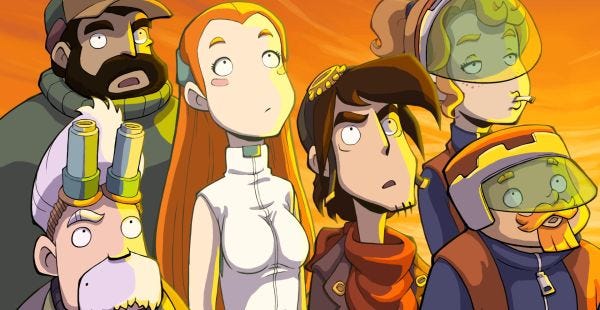Wot I Think: Chaos On Deponia
Trashy
It really is only three months since the first part of the Deponia trilogy was released. A German point and click adventure from Daedalic, it managed to wobble along the line of decent and frustrating, mostly making up for its biggest mistakes with some fun puzzles, decent voice acting, and a good number of laughs. So what about this time, with sequel Chaos On Deponia? Here's wot I think:
Nope. Partly suffering from middle-episode syndrome, and partly just being a generally poorer game, this second, shorter adventure focuses pretty much on what the first game got wrong, and little else.
The story is of a trash planet called Deponia, above which floats an idyllic city called Elysium. Rufus is an unliked loser, part-time inventor, and the man who believes is to save Deponia from being destroyed by the evil Organon - Elysium residents who want the planet blown up. In the first game Rufus met Goal, a sort of robot-elf lady thing, whose head contained vital codes for something or other. He pratted around a bit, met an arch enemy called Cletus, and then it sort of ended.
This time things pick up with Rufus and Goal back on Deponia, this time on a floating black market island, attempting yet again to escape. But early on Goal's personality cartridge gets split into three, causing Goal to become three different characters, interchangeable in the same body. Hilarity was supposed to ensue.
The biggest mistake the first game made was a bloated second act, that was set in a location far too sprawling, with too many puzzle chains open at once and little guidance as to what you were supposed to be doing. Either side of this section, it was mostly a decent time, despite being plagued with translation issues. This time, bewilderingly, the vast majority of the game takes place in a location even more sprawling, even more disparately linked, and even more obfuscated. There's no graceful introduction of the locations, no slow spread as the best adventures do. Instead you're given a great pile different places packed with ludicrously obscure puzzles, interconnecting with no coherent pathway.
The animation remains as splendid as the first part, and the voice acting is strong throughout. But this time their dialogue is far worse, and for every nice line ("Being careful is for people who don't like surprises.") there are a dozen that make absolutely no sense. Looking at one character elicits the response, "Who would have thought that under that rough exterior, there was such a ridiculous sofa covering." Right, I see.
Unfortunately, worse than the Germanlish gibberish is the tone being set here. I lamented that the first game cast yet another unlikeable moron as your playable character, and grumbled that there were no signs of a path to redemption beyond odd allusions to an absent father. This time out Rufus continues to be a one-tone twat, with no narrative progression in any direction, and the father character is revealed with a whimper having no impact whatsoever. Even in finding out his cruel father might not even be his parent, Rufus continues just making tiresome asides and inconsequential blabber.
And the veiled sexism of the previous game is far less hesitant this time around. Goal - who in the first game was mostly unconscious and fought over as property - has her already paper-thin character ripped into three constituent parts: Baby, Spunky and Lady. Because that's what makes up a woman. Baby is naive and delighted, Spunky is brutish and rude, and Lady is prissy and still rude. The latter two are entirely interchangeable. It wouldn't seem too much to ask to expect that there could have at least been an attempt at something smart here, perhaps an id, ego and super-ego, but instead it's just three stereotypes of a snippy woman. A highlight late in the game is the declaration from Rufus, "You're lucky I don't hit women." Nice.
But women need not worry at being singled out. Also rather disturbingly mocked are the blind, and the mentally ill. And people with speech impediments - at enormous length. One of the more awful puzzles requires that you give a long, tedious speech about some plans to a group of rebels led by a guy with a Scandinavian accent and a range of strong lisps. Rufus finds this hilarious! But he's going to summarise your speech, so you have to pick out the sentences that he won't slur, lest Rufus lose the audience by falling about laughing at the guy. Oddly, when he speaks the "correct" lines, this man switches to an English accent too - I've no idea what that was meant to mean.
There are some nice ideas in here, but they get lost in the muddle. One puzzle requires that you adjust the game's settings themselves, which is a damned brilliant idea. Except even this is spoiled by being yet another example of a correct solution only leading to yet another obtuse obstacle rather than any sense of reward. When you make even the best successes feel like failures, you're not doing your puzzling correctly.
It makes the silliest mistake a middle episode of a trilogy can make, in terms of failing to advance the story in any meaningful way. One sort-of revelation near the end doesn't actually change anything, and you end where you began, in the middle of no-plot-land. It feels like filler, because it is filler, despite a wealth of new characters flapping about inside it. And when that flapping is more frustrating that fun, it feels eminently skippable. Perhaps the third part will bring it all together, realise the potential of that first episode, and give us a satisfying story. But it's hard to imagine that even if it did, you wouldn't recommend someone skip this game when playing through the lot.













